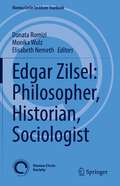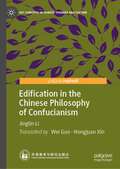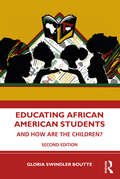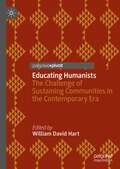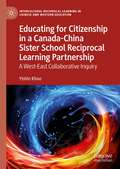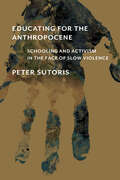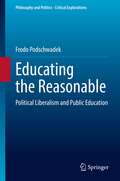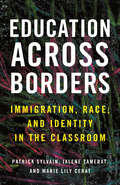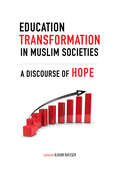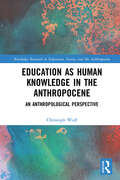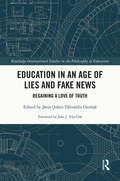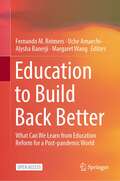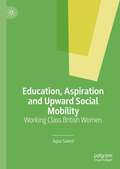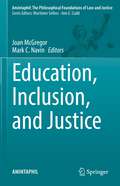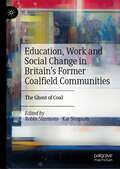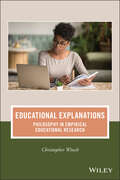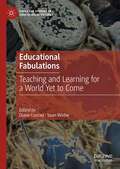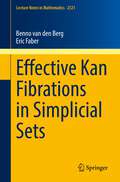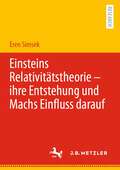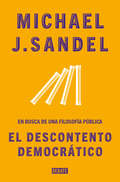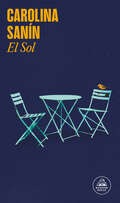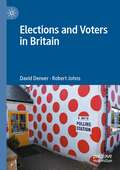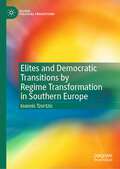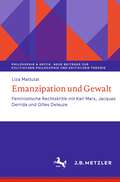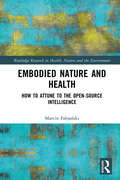- Table View
- List View
Edgar Zilsel: Philosopher, Historian, Sociologist (Vienna Circle Institute Yearbook #27)
by Elisabeth Nemeth Donata Romizi Monika WulzThis book provides a new all-round perspective on the life and work of Edgar Zilsel (1891-1944) as a philosopher, historian, and sociologist. He was close to the Vienna Circle and has been hitherto almost exclusively referred to in terms of the so-called “Zilsel thesis” on the origins of modern science. Much beyond this “thesis”, Zilsel’s brilliant work provides original insights on a broad number of topics, ranging from the philosophy of probability and statistics to the concept of “genius”, from the issues of scientific laws and theories to the sociological background of science and philosophy, and to the political analysis of the problems of his time. Praised by Herbert Feigl as an “outstanding brilliant mind”, Zilsel, being as a Social-Democrat of Jewish origins, mostly led a life of hardship marked by emigration and coming to a sudden and tragic end by suicide in 1944. The impossibility of an academic career has hindered the reception of Zilsel’s scientific work for a long time. This volume is a contribution to its late reception, providing new insights especially into his work during his years in Vienna; moreover, it shows the heuristic value of Zilsel’s ideas for future scholarly research – in philosophy, history, and sociology.
Edification in the Chinese Philosophy of Confucianism (Key Concepts in Chinese Thought and Culture)
by Jinglin LiThis pivot focuses on “the concept of edification” in a bid to systematically expound its connotative structure and logical evolution. It is divided into ten chapters, embracing various issues, such as human nature as the foundation of edification, the development of edification and cultivation, the evolution of edification and the resultant life based on ritual and music, the political orientation and ultimate care of edification, and the nurturing of social edification, in an effort to offer a panoramic view of the intellectual features of Confucianism, and consequently a profound reflection on the cultural consciousness of contemporary China. The book is expected to satisfy the needs for a better understanding of edification as a Confucian concept, and the conceptual features of Chinese philosophy, or rather, Confucianism.
Educating African American Students: And How Are the Children?
by Gloria Swindler BoutteThis straightforward and reader-friendly text provides strategies for P-12 educators who are interested in ensuring the cultural and academic excellence of African American students. It presents a careful balance of published scholarship, a framework for culturally relevant teaching, and research-based cases of teachers who excel at teaching Black children. Examples from multi-ethnic teachers across P-12 grades and content areas (e.g., ELA, science, mathematics, social studies, arts) are presented so that others can extrapolate in their respective educational settings. This book explains Black culture, anti-Black racism, African Diaspora Literacy, African American Language, and pro-Black and actionable steps that educators can adopt and implement. Examples of culturally relevant family and community involvement are provided. As with the previous edition, readers will appreciate a multitude of resources. After reading this book, educators will view educating African American students as exhilarating and rewarding and Black students will flourish.
Educating Humanists: The Challenge of Sustaining Communities in the Contemporary Era (Studies in Humanism and Atheism)
by William David HartThis volume explores the challenges that humanists face from hostile religious traditionalists on its right flank and from the political antihumanism, which is often postsecular, of critics on its left flank. Given this dual challenge, how can "secular" humanism educate, sustain, and reproduce itself?
Educating for Citizenship in a Canada-China Sister School Reciprocal Learning Partnership: A West-East Collaborative Inquiry (Intercultural Reciprocal Learning in Chinese and Western Education)
by Yishin KhooThis book enriches the discourse around Global Citizenship Education in teacher education through the example of a teacher's experience in a Canada-China Sister School reciprocal learning landscape. Instead of positioning global citizenship teaching and learning as a set of fixed goals to be attained by teachers alone, this book approaches global citizenship teaching and learning as unfinished lifework in progress and as situated curriculum problems to be inquired together by university researchers, school teachers, and students under the spirit of reciprocity and community. This reimagination of narratives, theory, and action start from collaborative and reciprocal learning partnerships among Chinese and Canadian researchers and teachers in the practicality of re-searching and re-enacting the purpose and meanings of twenty-first century education in a Canada-China Sister School setting.
Educating for the Anthropocene: Schooling and Activism in the Face of Slow Violence
by Peter SutorisThe work of environmental educators and activists in India and South Africa offers new models for schooling and environmental activism.Education has never played as critical a role in determining humanity&’s future as it does in the Anthropocene, an era marked by humankind&’s unprecedented control over the natural environment. Drawing on a multisited ethnographic project among schools and activist groups in India and South Africa, Peter Sutoris explores education practices in the context of impoverished, marginal communities where environmental crises intersect with colonial and racist histories and unsustainable practices. He exposes the depoliticizing effects of schooling and examines cross-generational knowledge transfer within and beyond formal education. Finally, he calls for the bridging of schooling and environmental activism, to find answers to the global environmental crisis.The onset of the Anthropocene challenges the very definition of education and its fundamental goals, says Sutoris. Researchers must look outside conventional models and practices of education for inspiration if education is to live up to its responsibilities at this critical time. For decades, environmental activist movements in some countries have wrestled with questions of responsibility and action in the face of environmental destruction; they inhabited the mental world of the Anthropocene before much of the rest of the world. Sutoris highlights an innovative research methodology of participatory observational filmmaking, describing how films made by children in the Indian and South African communities provide a window into the ways that young people make sense of the future of the Anthropocene. It is through their capacity to imagine the world differently, Sutoris argues, that education can reinvent itself.
Educating the Reasonable: Political Liberalism and Public Education (Philosophy and Politics - Critical Explorations #17)
by Frodo PodschwadekOffering the first developed account of political liberal education, this book combines a thorough analysis of the theoretical groundwork of political liberal education with application-oriented approaches to contemporary educational challenges. Following in depth engagement with the shortcomings of Rawls’ theory and addressing some key objections to neutrality-based restrictions in education, the volume moves on to provide an insightful discussion of topics such as same-sex relations in sex-education, the position of migrant children and the rights of religious parents to determine the education of their children. This book outlines a political liberal account of education which provides a useful contribution to the current debates about liberalism and education in a way unprecedented in the literature on political liberalism so far. It is of interest to anyone working at the intersection of political philosophy and philosophy of education as well as for scholars with a broader interest in how liberalism can respond to the challenges of value pluralism.
Education Across Borders: Immigration, Race, and Identity in the Classroom (Race, Education, and Democracy)
by Marie Lily Cerat Patrick Sylvain Jalene TameratA critical resource for K-12 educators that serve BIPOC and first-generation students that explores why inclusive and culturally relevant pedagogy is necessary to ensure the success of their studentsFor readers of White Folks Who Teach in the Hood…And The Rest of Y&’all Too, Education Across Borders is a strong teacher development resource for white educators who serve BIPOC students and are looking for culturally relevant pedagogies that value the diverse experiences of their students. The practices and values in the U.S. educational system position linguistically, culturally, and socioeconomically diverse children and families at a disadvantage.BIPOC dropout rates and levels of stress and anxiety have linked with non-inclusive school environments. In this collection, three educators and will draw on their experiences as immigrants and educators to address racial inequity in the classroom and provide a thorough analysis of different strategies that create an inclusive classroom environment.With a focus on Haitian and Dominican students in the U.S., the authors will reveal the challenges that immigrant and first-generation students face. They'll also offer insights about topics such as: • How do language policies and social justice intersect? • How can educators use culturally relevant teaching and community funds of knowledge to enrich school curriculum? • How can educators center the needs of the student within the classroom? • How can educators support Haitian Creole-speaking students?
Education Transformation in Muslim Societies: A Discourse of Hope (Advancing Education in Muslim Societies)
by Shelley Wong Nuraan Davids Andreas M. Krafft Bassam Abu Hamad Mualla Selcuk Suhailah Hossien Sulieman Mleahat Nora El-Bilawi Sher Afgan Tareen Afeefa Syeed Tyron PittsHope is a complex concept—one academics use to accept the unknown while also expressing optimism. However, it can also be an action-oriented framework with measurable outcomes.In Education Transformation in Muslim Societies, scholars from around the world offer a wealth of perspectives for incorporating hope in the education of students from kindergarten through university to stimulate change, dialogue, and transformation in their communities. For instance, though progress has been made in Muslim societies on early education and girls' enrollment, it is not well documented. By examining effective educational initiatives and analyzing how they work, educators, policymakers, and government officials can create a catalyst for positive educational reform and transformation. Adopting strength-based educational discourse, contributors to Education Transformation in Muslim Societies reveal how critical the whole-person approach is for enriching the brain and the spirit and instilling hope back into the teaching and learning spaces of many Muslim societies and communities.Education Transformation in Muslim Societies is a copub with the International Institute of Islamic Thought.
Education as Human Knowledge in the Anthropocene: An Anthropological Perspective (Routledge Research in Education, Society and the Anthropocene)
by Christoph WulfThis book examines the concepts of the Anthropocene and globalisation in our society and the changes that these are bringing about in education and human learning. The book argues that there needs to be reflexive approach to issues that affect the fate of the planet and the future of humans, brought about by an education that looks to the future. Wulf argues that a change in education and socialization can only succeed based on an understanding of previous educational ideas, and considers the significance of Confucianism and spiritual education that emerged in the East. The book traces key educational ideas throughout history to show how education and human knowledge are closely linked, highlighting the need for us to pay careful attention to repetition, mimesis and the imagination in learning. It shows how a future-oriented education must engage with issues of peace and violence, global citizenship and sustainable development. This timely and compelling book will be of great interest to researchers, academics and students in the fields of philosophy of education, the history and anthropology of education, sustainability education and global citizenship education
Education in an Age of Lies and Fake News: Regaining a Love of Truth (Routledge International Studies in the Philosophy of Education)
by Jānis John Tālivaldis Ozoliņš João J. Vila-ChãThe ‘post-truth’ world in which we live has been beset by fake news, lies and a cavalier disregard for truth. If truth is neglected then an alternative is an appeal to the emotions in order to validate a particular position, which can quickly turn to the use of power to impose a particular view. The loss of truth results in the loss of freedom. This book contends that if we want to preserve our freedom then we have a serious obligation to pursue truth. One way to do this is through an adequate moral education. Education in an Age of Lies and Fake News: Regaining a Love of Truth makes an argument for the importance of truth. It explores how we can retrieve the concept of truth and how moral education can be deployed in order to re-establish a commitment to truth. It introduces Eastern perspectives on the question of truth and how we view reality, and presents a realist position on the nature of truth as a counter to scepticism, drawing on Augustine and Thomas Aquinas, amongst others. Further, the chapters are mindful of the significance of developing a pedagogy which not only enables students to be critical thinkers, but to foster a genuine concern for truth and for its pursuit. This book will be essential reading for students, educators, philosophers and researchers pursuing the question of truth in the modern age.
Education to Build Back Better: What Can We Learn from Education Reform for a Post-pandemic World
by Fernando M. Reimers Uche Amaechi Alysha Banerji Margaret WangThis open access book examines the implications of the COVID-19 Pandemic for education systems and argues that major education reforms will be necessary, particularly in the Global South, to address the learning loss caused by the pandemic. To inform those reforms, knowledge about the implementation reforms in the Global South is necessary, and such knowledge is seriously lacking as the existing literature on the implementation of educational change focused principally in reforms in countries in the Global North. This book contributes to address this gap by examining five major education reforms in India, Egypt, Taiwan, Vietnam, and Senegal, and by presenting two novel approaches to climate change education using a bottoms up strategy of reform. The chapters examine the implementation process drawing on a theoretical model of educational change by Reimers (published in Educating Students to Improve the World by Springer in 2020). The book concludes discussing the implementation of such reforms as an evolutionary and learning process, characterized by four dimensions: the goals of the reform, the drivers of the reform, the reform strategy, and the mindsets about educational change which undergird the implementation strategy.
Education, Aspiration and Upward Social Mobility: Working Class British Women
by Aqsa SaeedThis book explores the career aspirations, achievements and consequent social mobility of a group of British Pakistani women. It uses Bourdieu’s concept of cultural capital to analyse how these women, living in a segregated Pakistani community located in a deprived northern town in the UK with poor employment opportunities, acquired the resources to pursue further and higher education, obtain qualifications and enter professional careers. The author discusses and analyses how cultural capital features in homes, schools and workplaces, as well as how the women navigate and modify intersecting gender, ethnic and class identities in order to create specific career trajectories. Illuminating the rich intersections of biography, history and society, the author captures important qualitative data which acts as a microcosm for contemporary discussions on social mobility, multiculturalism, Muslim communities, race, and gender in Britain.
Education, Inclusion, and Justice (AMINTAPHIL: The Philosophical Foundations of Law and Justice #11)
by Mark C. Navin Joan McGregorThis book approaches education as a vital human good, both because it fosters the development of intellectual, moral and civic virtues, and because it promotes the development of valuable skills for work and for life. Accordingly, debates on justice, democracy, equality and inclusion often focus on questions concerning the kind of education people should receive, how scarce educational goods should be distributed, and the role of education in responding to historical and ongoing injustices. This volume collects 16 new essays that explore these pressing ethical, political and legal issues.
Education, Work and Social Change in Britain’s Former Coalfield Communities: The Ghost of Coal
by Robin Simmons Kat SimpsonThis edited book presents a range of chapters written by new and established authors, drawing on a range of different perspectives and traditions to critically analyse education, work and social change in the former coalfields. Historically, coal was one of Britain’s major industries, employing over a million men at its peak. But mining was more than an occupation - it was a way of life for those living and working in coalfield communities. Work, leisure, family relations and other dimensions of social life were centred upon the coal industry and its related institutions such as trade unions, working-men’s clubs and welfare institutes. These communities have, however, undergone significant social and economic change over time, not least in terms of the pain and suffering associated with the Great Strike of 1984–85, the successive waves of pit closures which took place thereafter and the eventual demise of the coal industry. The book will be of interest to academics drawing on sociology, social policy, history, geography and other subject disciplines.
Educational Explanations: Philosophy in Empirical Educational Research (Journal of Philosophy of Education)
by Christopher WinchEDUCATIONAL EXPLANATIONS Educational Explanations is a comprehensive study of the main philosophical questions that confront empirical educational researchers. The book outlines the sense in which empirical educational research pursues truth and sets out and defends an account of its task as the offering of explanations for the many educational problems that claim our attention. The book goes on to look at the criteria for high quality research, the relationship between different methodological approaches and the scope and limits of intervention studies. At all stages detailed examples are presented to make the argument clearer. A distinctive feature of the book is the presentation of four detailed case studies, over four chapters, of influential educational research programmes that not only examine what they have achieved, but emphasise the conceptual issues that researchers are confronted with as they seek to provide explanations. The book goes on to examine the impact of empirical educational research on educational practice and on the practice of teachers in particular.
Educational Fabulations: Teaching and Learning for a World Yet to Come (Palgrave Studies in Educational Futures)
by Sean Wiebe Diane ConradThis highly original collection presents speculative fiction as fiction-based research to re-imagine education in the future. Given the particular convergence of economic and governmental pressures in educational institutions today, schools represent imaginative sites especially well-suited to interrogation through an SF lens. The relevance for education of the exploration and interrogation of themes related to technology, human nature, and social organization is evident; yet the speculative fiction approach is unique in its harnessing of creative capacities to envision alternatives. The contributions in this collection are generated from educational experience and research, drawing on scholarship in curriculum studies and teacher education and on the authors' experiences and imaginations as teachers, teacher educators, educational scholars, and human beings.
Effective Kan Fibrations in Simplicial Sets (Lecture Notes in Mathematics #2321)
by Benno van den Berg Eric FaberThis book introduces the notion of an effective Kan fibration, a new mathematical structure which can be used to study simplicial homotopy theory. The main motivation is to make simplicial homotopy theory suitable for homotopy type theory. Effective Kan fibrations are maps of simplicial sets equipped with a structured collection of chosen lifts that satisfy certain non-trivial properties. Here it is revealed that fundamental properties of ordinary Kan fibrations can be extended to explicit constructions on effective Kan fibrations. In particular, a constructive (explicit) proof is given that effective Kan fibrations are stable under push forward, or fibred exponentials. Further, it is shown that effective Kan fibrations are local, or completely determined by their fibres above representables, and the maps which can be equipped with the structure of an effective Kan fibration are precisely the ordinary Kan fibrations. Hence implicitly, both notions still describe the same homotopy theory. These new results solve an open problem in homotopy type theory and provide the first step toward giving a constructive account of Voevodsky’s model of univalent type theory in simplicial sets.
Einsteins Relativitätstheorie – ihre Entstehung und Machs Einfluss darauf
by Eren SimsekRoman U. Sexl schreibt in seinem Artikel „Der unerschöpfliche Albert Einstein“, dass „gerade rund um die Ursprünge der speziellen Relativitätstheorie einige wesentliche wissenschaftsgeschichtliche Fragen“ noch offen stehen und betont: „Eine der interessantesten Fragen betrifft die Quellen Einsteins.“ Von ihm kommt der wichtige Hinweis, sich Einsteins Kyoto-Rede bzw. die „, inoffizielle Nobelpreisrede‘“ näher anzusehen. Diese Rede, in welcher Einstein genau vor hundert Jahren die Entstehungsgeschichte der Relativitätstheorie erläutert, ist von größerem Interesse, weil Einstein darin oft auf Mach hinweist. Weder der historische Kontext der Rede wurde bis jetzt untersucht noch der Versuch unternommen, den Inhalt der Rede zu rekonstruieren. Betrachtet man den historischen Kontext, erweist sich dieser Vortrag nämlich zum Teil als Einsteins Reaktion auf das (gefälschte) Vorwort in Die Prinzipien der physikalischen Optik, worin E. Mach als Relativitätstheorie-Gegner dargestellt wurde. Einstein macht in seiner Rede darauf aufmerksam, welch wichtige erkenntnistheoretische Rolle Machs Arbeiten für ihn hatten. Aufgrund der neuen Ergebnisse in der Mach-Einstein-Forschung werden in dieser Arbeit daher die Entstehungsgeschichte der Relativitätstheorie sowie der Inhalt der Kyoto-Rede wissenschaftsgeschichtlich rekonstruiert und Machs Einfluss darauf genauer analysiert.
El descontento democrático: En busca de una filosofía pública
by Michael J. SandelEl profesor de filosofía más famoso del mundo analiza los peligros a los que se enfrenta la democracia. «Una profunda contribución anuestra comprensión de los descontentos actuales».The Wall Street Journal La división, la crispación y la polarización han dado un vuelco al escenario político internacional. El murmullo de descontento que comenzó en los años noventa ha llevado a ciertos sectores de la sociedad a manifestar una clara animadversión hacia el proyecto globalizador de las élites. Gobernantes y ciudadanía parecen preferir el libre mercado en lugar de una democracia saludable. Conceptos como «libertad» o «civismo» han dejado de generar consenso y se han convertido más que nunca en armas arrojadizas entre adversarios electorales. Mientras, aumentan las desigualdades sociales, la injusticia racial y el hiperpartidismo, y las fronteras nacionales pierden su relevancia económica e identitaria. En esta nueva edición de El descontento democrático, publicado por primera vez en 1996 y actualizado a los nuevos tiempos, Michael J. Sandel explora de un modo certero e iluminador las causas de la profunda decepción que se ha apoderado de la vida pública en las democracias occidentales. A través del caso de Estados Unidos, nos proporciona herramientas para comprender cómo en tiempos de guerras culturales, donde cada vez es más difícil que surjan movimientos reformistas de amplia base social, nuestra tradición cívica puede ayudarnos a imaginar una alternativa al sistema neoliberal y tecnocrático en que estamos instalados, donde la identidad y los ideales comunes están cada vez más devaluados. La crítica ha dicho:«Provocador. Defiende que las democracias modernas no podrán sostenerse a menos que encuentren la manera de hacer frente a la economía global y, al mismo tiempo, dar expresión a las identidades distintivas de sus pueblos».The New York Times «Una profunda crítica del liberalismo estadounidense que, a diferencia de otroslibros sobre el tema, busca su restauración como ética política. Un libro repleto de ideas valiosas».Kirkus Reviews «Entre los méritos que lo hacen único están la admirable combinación de análisis conceptual e investigación histórica, y la impresión de una mente genuinamente reflexiva y un espíritu generoso».Canadian Journal of Philosophy «Una de las obras más poderosas de filosofía pública aparecidas en los últimos años. Un diagnóstico brillante».U.S. News & World Report«Un libro importante sobre el significado de la libertad. El análisis es soberbio».The Washington Post Book World «Pocos libros son tan relevantes un cuarto de siglo después de su aparición como cuando se publicaron, pero Michael Sandel ha conseguido que este clásico lo sea aún más».Samuel Moyn «Profundamente perspicaz, nunca ha sido más oportuno que hoy. Una lectura esencial —y esperanzadora— para quienes se preguntan si nuestro experimento democrático sobrevivirá en el siglo XXI».Greta R. Krippner
El sol
by Carolina Sanín PazDe la escritora de Somos luces abismales, presentamos El Sol: un libro claro y misterioso que no atiende a la separación entre los géneros y en el que se mezclan, con tanto gozo como maestría, el ensayo, la poesía y la narrativa. "Todo lo que vive quiere ver el sol siguiente. Todo quiere no solo no morir, sino seguir naciendo. Una vez más, otra vez, salir al día, y que la siguiente sea la misma vez y nueva. Probar el límite, no llegando sino volviendo a empezar. "Eso me parece que pasa. Eso me nubla, pues no quiero primero la muerte, pero no tengo el callado entusiasmo de la vaca, o de lo que puedo imaginarle: su aliento. Su confianza en que estará viva en la mañana. Su querer la confianza. Su impulso central de arriba abajo: el Sol, que recorre su arco para ella; que sale de bajo la panza de la vaca -que es un puente- y va subiendo, y se pone encima de la vaca, sobre su lomo recto, esa línea que la limita por encima, esa derechura casi prodigiosa, casi humorística, que hace pensar bien en la cabeza y en la cola al conectarlas limpiamente, un horizonte íntimo...".
Elections and Voters in Britain
by Robert Johns David DenverHow do voters in Britain decide which party to vote for in elections? Have age and education replaced class as the social basis for voting? Are elections now ‘presidentialised’, with voters simply choosing between party leaders? What role do the media, new and old, play in all of this? The authors examine these and other questions in the fourth edition of this popular text. The core of the text is devoted to examining and explaining theories of party choice, including the debate about whether voters are driven more by issues and ideology or simply by which party and leader looks least likely to make a mess of things in office. The authors also devote separate chapters to turnout trends and patterns, the media, electoral systems, the geography of party support, and – new to this edition – referendums. Fully revised and with detailed analysis of the 2019 election and the electoral fallout of Brexit, the text incorporates the latest research on elections and voting behaviour, and includes analysis of recent trends and developments – such as the effect of digital media on electoral politics and where recent misfires leave the opinion polls.
Elites and Democratic Transitions by Regime Transformation in Southern Europe (Global Political Transitions)
by Ioannis TzortzisThis book examines three cases of democratic transitions by self-transformation of the non-democratic regimes in Southern Europe—the Spanish reforma pactada-ruptura pactada of 1976-77, the Greek “Markezinis experiment” of 1973, and the Turkish democratic transition of 1983—in a comparative perspective. The author argues that a democratic transition initiated by the regime elites is, in contrast to widely held assumptions and notwithstanding some reservations on whether democracy can be (re-)introduced by non-democrats, worth viewing as a “window of opportunity” for democratisation. It is up to the democratic counter-elites to respond to it, using the civil society and the international factor as allies to achieve their goal of acquiring more concessions from the regime.
Emanzipation und Gewalt: Feministische Rechtskritik mit Karl Marx, Jacques Derrida und Gilles Deleuze (Philosophie & Kritik. Neue Beiträge zur politischen Philosophie und Kritischen Theorie)
by Liza MattutatSoziale Bewegungen stehen seit jeher in einem ambivalenten Verhältnis zum Recht. Einerseits versuchen sie oft, ihre Ansprüche als Rechte geltend zu machen, andererseits kritisieren sie die entpolitisierenden, gewaltsamen und repressiven Aspekte des Rechts. Liza Mattutat fragt deshalb, ob Rechtspolitiken möglich sind, die nicht nur die Inhalte des Rechts, sondern zugleich seine Form verändern. Dazu rekonstruiert sie die rechtskritischen Argumente von Karl Marx, Jacques Derrida und Gilles Deleuze und deutet mit ihnen zeitgenössische Auseinandersetzungen um die Ehe für alle, die Reform des Sexualstrafrechts und die Elternschaft von trans* Personen. Wo sind philosophische Rechtskritiken für die feministische Rechtspolitik einschlägig? Wo steht das bürgerliche Recht emanzipatorischen Bewegungen entgegen?
Embodied Nature and Health: How to Attune to the Open-source Intelligence (Routledge Research in Health, Nature and the Environment)
by Marcin FabjańskiThis book describes how, as a species our survival and capacity to flourish depends on realizing the intimate relationship of humans with nature through active, embodied participation with nature. Living within the physicality of the planet is not a limitation, rather it is our liberation. Full realization of the consequences of this relationship, through embodied action, can liberate us from ego-dependence and transform us into a community of interdependent and flourishing beings. Embodied Nature and Health: How to Attune to the Open-source Intelligence describes a systems analysis of presence-centered cultivation of well-being through particular ways of being physically and mentally active in relation to nature that aims at helping the individual attune to natures’ rhythms. The systems analysis proposes the hypothesis of the Open-source Intelligence: an intelligence which originates from the placement of individual organisms in the tissue and the process of life. This framework draws upon and integrates contemporary research into the human–nature relationship and human well-being, and ancient philosophies that were developed prior to the Cartesian gap between the mind and the body, as well as using an auto-ethnographic approach dervied from the experience of the author. The proposed system highlights a practical approach to well-being, based on research into human attention and its effective usage in daily life. The book outlines a methodology that can be used in schools, as a basis of training in sports, as well as in the field of self-development, and highlights the necessity to develop a new, non-abusive relationship with the natural environment. This novel, multi-discipline, first-of-its-kind research book will be of strong interest to experts and academics in the fields of physical activity, education, ecology, and philosophy.
